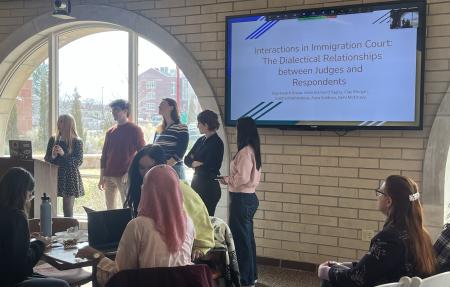From the Courthouse to the Classroom: Where Academia Meets Advocacy
by Jake Townsend
Professor Rebecca Galemba defies expectations for what students gain from a methods course. Her qualitative research class prioritizes community-based learning, imparting research skills, and encouraging local connections that lead to politically engaged lives and careers.
The migrant crisis in Denver has escalated in recent years as asylum-seekers from South and Central America seek refuge in the United States. Many migrant families lack shelter and other essential resources as they await trials to claim asylum. After the Biden administration made a dedicated court docket to hasten cases for some asylum-seeking family units, the legal system in sanctuary cities like Denver has struggled to keep pace. Since 2020, student cohorts in Dr. Galemba’s class have watched hundreds of these court proceedings to research the consequences of Biden’s expedited docket.
Professor Galemba has always championed an applied approach to research, typically on topics of migration and labor. She says, “A lot of my methods course is about building community relationships, and even though students are with these projects briefly, I am the constant tying them quarter to quarter.”
Sami McKinsey is one of the student researchers. She’s pursuing her M.A. in International Human Rights and has worked with migrants and refugee populations before. She quickly became involved with the court watch project after starting as a research assistant for Professor Galemba in the summer of 2023. “Every judge that I’ve interacted with is just trying to help,” she says, describing some observations in the courtroom. “Most of these migrants are unrepresented. Judges may try to give them legal advice and walk them through the process, but their priority is to get through as many cases as possible.”
Ella Iveslatt is another court watch researcher who recently graduated from the Korbel School, double majoring in International Studies and Economics. She got involved as a data analyst for the project, and Ella has poured through hundreds of pages of notes from student observers and attended some proceedings herself. Similarly to Sami, Ella noted how the judge’s demeanor could make all the difference: “Different judges have different capacities and willingness to assist. Some judges will be more stand-offish. Others will know when they are doing something wrong and appreciate the accountability.” Ella noted that something as simple as submitting an official address can be a big hurdle for migrants, which became the focus of her honors’ thesis. “Migrants have to report their address separately to different branches of the immigration system, like ICE, the DHS, and immigration court. Language barriers may lead to mistranslation of addresses by government agents, and not having an accurate address on file can make all the difference in how a court case turns out.”
Sami and Ella both recounted their challenges as observers in the courtroom. There often wouldn’t be anywhere to sit, and migrants may look to them for advice or assistance. Ella described an experience when she played hide-and-seek with the daughter of a migrant family during a court proceeding: “Here I am studying these systems designed for her and her mother to fail, and I can’t really do anything about it right now. Even though I’m in this work to eventually change the system, there’s something difficult about feeling powerless to help these families today.”
Despite the challenging work, Sami and Ella are grateful for their experiences. Sami shared that the project granted her an invaluable perspective on the nature of International Studies, forever shaping her career trajectory. “Sometimes people at Korbel think that International Affairs means working outside the States,” Sami says, “but it’s here as well. And I think migration in the U.S. is often overlooked as a space for these studies.” Ella has now decided to pursue a career in immigration law and encourages other students to be bold when presented with opportunities like these. “Don’t underestimate yourself. There are so many opportunities for growth when you’re doing work like this. It can be a very scary process, but learning as I go has taught me more than I ever could in a classroom setting.”
Ultimately, Professor Galemba will steer the project toward completion. With multiple student-led projects worth of data (in addition to this one) and IRB applications to write every year, it can be a difficult process to sustain. Though Dr. Galemba maintains it’s all worth it in the end. “Students also learn about the immigration system,” she says. “Even students who are already critical about the system, this is the first time they experience what conditions are actually like for immigrants ostensibly getting their ‘day in court’. Yes, students are learning methods and how to partner with community organizations, but they are also learning about obstacles to immigrant justice alongside efforts to transform unjust systems.”
Professor Galemba hopes to write an article on her pedagogical approach to teaching methods. She also aims to pull data from the court watch project to live in a visual database for nonprofits and immigration advocacy networks. The DU Immigrant & Refugee Rights Colectivo houses many other student perspectives on this project and others through the DU Center for Immigration Policy & Research which she co-directs with Lisa Martinez (DU Sociology), showcasing the passion at DU for engaging with this important social issue. Many of her students have gone on to work in related fields; some even with partner organizations from the class.
At the Korbel School, our faculty connect students’ passions directly with their communities to allow for meaningful social change, personal growth, and educational opportunities that extend well beyond the classroom. Professor Galemba sets a novel example of what engaged scholarship can look like at the graduate level.



